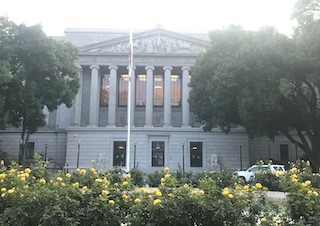It may come as a shock and be quite confusing to many readers that a person in prison or jail may not represent himself or herself on an appeal of a denial of post-conviction relief. Such an in pro per filing is simply rejected on procedural grounds, which many prisoners do not understand. The following summary explains why this is so.
The Gist of this Article: There is no right of a prisoner to file a pro se or in pro per appeal of a denial of post conviction relief, as the following summary of a recent Third Appellate District Court case explains. Instead, such an appeal must be filed by an attorney representing the prisoner.
In San Joaquin County, Defendant Frankie James Weisner pled no contest to second-degree robbery (Penal Code § 211), grand theft (Penal Code § 487(c)) and admitted that he personally used a firearm in the robbery (Penal Code § 12022.5(a)).
His first appeal was rejected as being filed too late (more than 60 days after entry of judgement).
He then filed a petition for reclassification of his grand theft conviction to a misdemeanor under Proposition 47 (Penal Code § 1170.18), which the trial court judge denied.
Mr. Weiser, acting in pro per, then filed an appeal of the order denying his petition for reclassification after the trial court denied his request for a certificate of probable cause to appeal. The appeal also argued ineffective assistance of counsel (IAC) and that the prosecution filed to disclose exculpatory evidence to him during trial.
The Third Appellate District Court regarded the in pro per appeal as ostensibly being presented under People v. Wende (1979) 25 Cal. 3d 436, wherein a criminal defendant is permitted to file a memorandum with the appellate court after his or her appointed appellate counsel has examined the record and found no legal or factual issues for appeal and so notifies the client that he or she may file a statement with the appellate court presenting such arguments. The appellate court must then examine the entire record, looking for an error.
 Court of Appeal Third Appellate District Sacramento
Court of Appeal Third Appellate District Sacramento
The “Wende procedure,” as some may refer to it, only applies to a defendant’s first appeal as of right because after such an appeal, there is no appeal to effective assistance of counsel. The U.S. Supreme Court and the California Supreme Court have rejected the ineffective assistance of counsel argument on an appeal from a denial of post-judgment relief. See Pennsylvania v. Finely (1987) 481 U.S. 551, at 555; and Conservatorship of Ben C. (2007) 40 Cal. 4th 529, at 538-543.
The same courts have not extended the Wende procedures, allowing pro per filings, past the first appeal as of right. Put another way, “[T]her is no right – constitutional, statutory, or otherwise – to self-representation in a criminal appeal in California.” See People v. Stanworth (1969) 71 Cal. 2d 820, 834-835. Neither the Sixth Amendment nor the due process clause of the Fourteenth Amendment to the federal Constitution furnishes a basis for finding such a right. Martinez v. Court of Appeal of Cal., Fourth Appellate Dist. (2000) 528 U.S. 152, 160-163.
As relevant here, “represented capital inmates are not permitted to present their automatic appeals personally to this court. That is, such inmates have no right personally to supplement or supersede counsel’s briefs and arguments on the merits of their appeals.” People v. Clark (1992) 3 Cal. 4th 41, 173; People v. Mattson (1956) 51 Cal.2d 777, 798.
The court in Mattson explained that pro se submissions pertaining to an appeal will not be filed or considered “because of the undesirability of fruitlessly adding to the burdens of this court the time-consuming task of reading pro se documents which are not properly before us, and, if they be read, of consequently enlarging [the] opinion by a recountal and discussion of the contentions made propia persona . . .” Mattson, supra, 51 Cal. 2d at p. 798.
There are certain exceptions, such as Marsden motions to substitute counsel, but such motions must be clearly labeled as such and must be limited to matters concerning representation. Clark, supra, 3 Cal. 4th at p. 173.
Thus, in a non-Wende appeal, the defendant, as an individual, does not have the right to submit his or her own arguments to the court for resolution.
Therefore, Mr. Weisner’s appeal was dismissed.
The citation for the Third Appellate District Court ruling discussed above is People v. Frankie James Weisner (3d App. Dist., 2021) 77 Cal. App. 5th 1072, 293 Cal. Rptr. 3d 184.
For more information about Wende issues, please click on the following articles:
 Court of Appeal Third Appellate District Sacramento
Court of Appeal Third Appellate District Sacramento